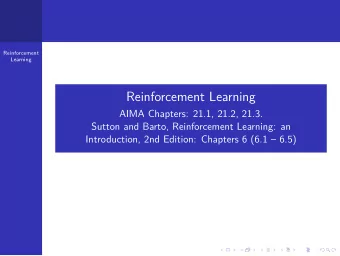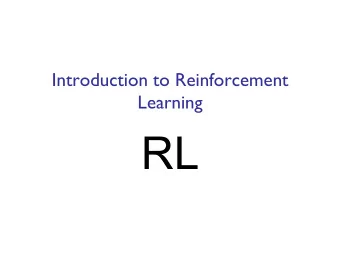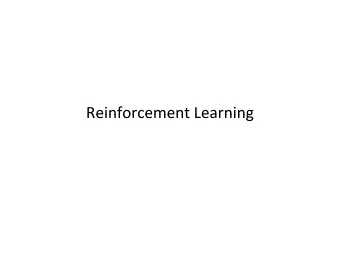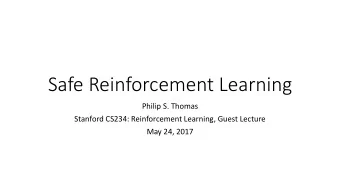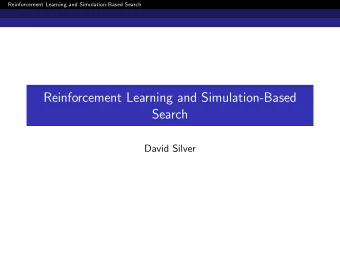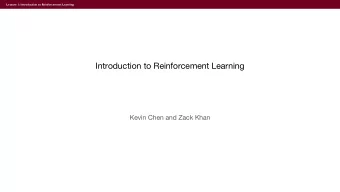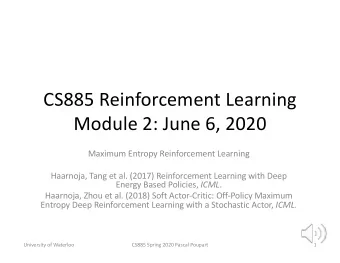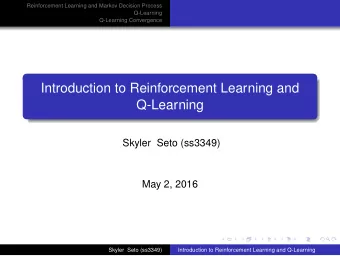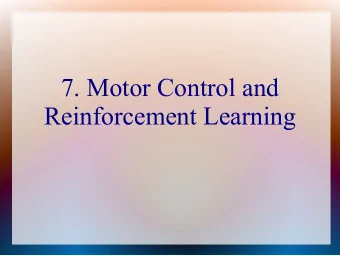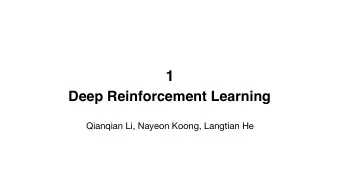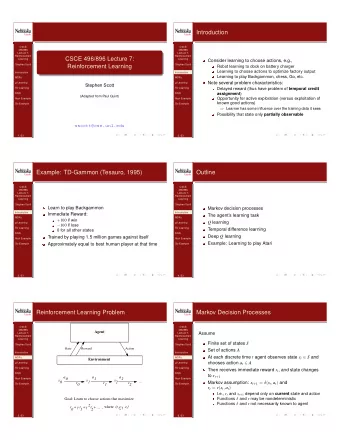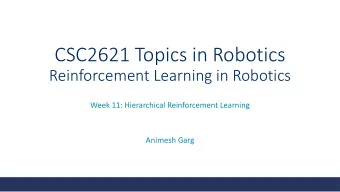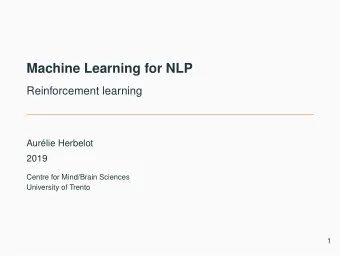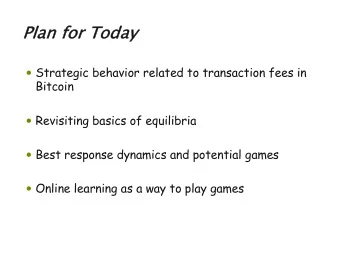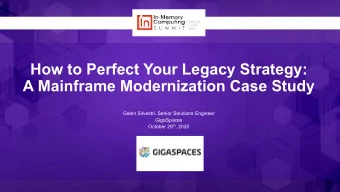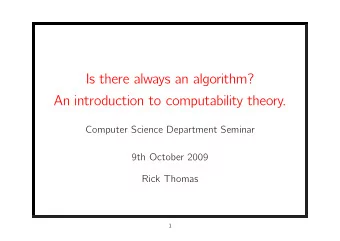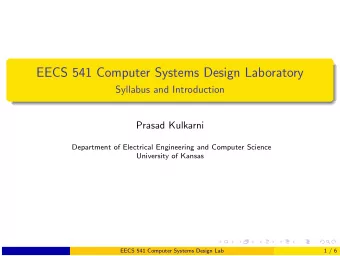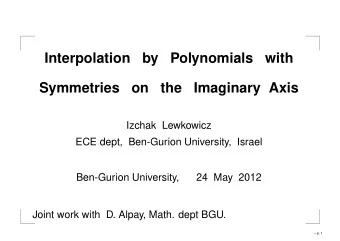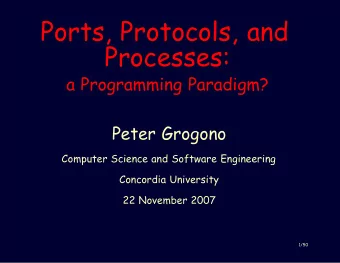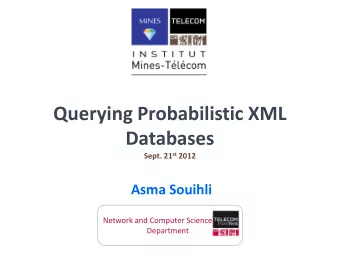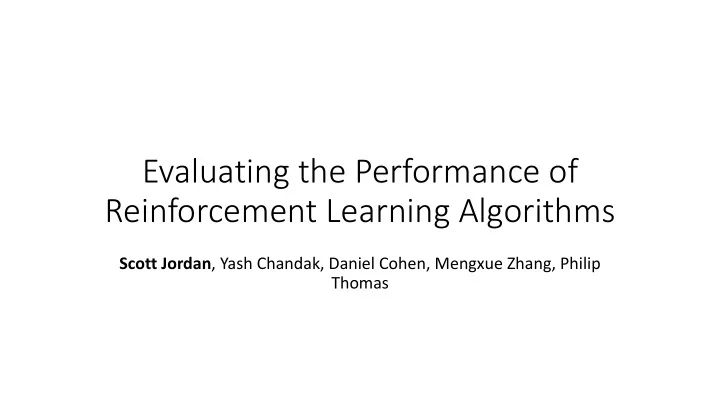
Evaluating the Performance of Reinforcement Learning Algorithms - PowerPoint PPT Presentation
Evaluating the Performance of Reinforcement Learning Algorithms Scott Jordan , Yash Chandak, Daniel Cohen, Mengxue Zhang, Philip Thomas Why do we care? Performance evaluations: 1. Justify novel algorithms or enhancements 2. Tell us what
Evaluating the Performance of Reinforcement Learning Algorithms Scott Jordan , Yash Chandak, Daniel Cohen, Mengxue Zhang, Philip Thomas
Why do we care? Performance evaluations: 1. Justify novel algorithms or enhancements 2. Tell us what algorithms to use If done correctly: • Can identify solved problems • Place emphasis on areas that need more research
RL Algorithms for the Real-world Want: 1. High levels of performance 2. No expert knowledge required As a result: 1. less time tuning algorithms 2. More time solving harder problems
Algorithm Performance Evaluations Typical evaluation procedure: 1. Tune each algorithm’s hyperparameters (e.g., policy structure, learning rate) 2. Run several trials of using tune parameters 3. Report performance (metrics, learning curve, etc.) Need a new evaluation procedure! This does not fit our needs: • Ignores the difficulty of applying algorithms
Evaluation Pipeline ��������������� ���������������� �������������� ���������� ��������� ������������������ ������������� ����������� ����������� ������������ Account for Balance importance difficulty applying of each environment an algorithm
A General Evaluation Question Which algorithm(s) perform well across a wide variety of environments with little or no environment–specific tuning? Existing evaluation procedures cannot answer this question We develop techniques for: 1. Sampling performance metrics that reflect knowledge of how to use the algorithm 2. Normalizing scores to account for the intrinsic difficulties of each environment 3. Balancing the importance of each environment in the aggregate measure 4. Computing uncertainty over the whole process
Sampling Performance Without Tuning • Formalize knowledge to use an algorithm Complete algorithm definition
Sampling Performance Without Tuning An algorithm is complete on an environment, when defined such that the only required input to the algorithm is the environment. No 𝑌 ∼ alg (𝑁) hyperparameters! Performance algorithm environment sample
Making Complete Algorithm Definitions • Open research question! methods M a n u a l random sampling smart heuristics adaptive methods
Performance of Complete Algorithms Well tuned Better algorithm Can measure improvements in usability! Diverging runs
Comparisons Over Multiple Environments Problem: • No common measure of performance Desired normalization properties: • Same scale and center • Capture intrinsic difficulty Use cumulative distribution function
Normalizing Scores
Normalizing Scores
Normalizing Scores
Normalizing Scores Which algorithm to normalize against? Large change in difficulty Use weighted combination of all CDFs Small change in difficulty
Aggregating Performance Measures • Need to weight normalization ℳ functions 𝑟 $ E 𝐺 ! (𝑦 𝑛 ) 𝑎 ! = # 𝑟 " # • Need to weight environments " $ • Avoid unintentional bias in weightings Aggregate Environment Normalization Normalization performance weights weights function Use game theory! of algorithm x
Normalization Two-Player Game Algorithm Use 𝑟 from equilibrium solution to evaluate each algorithm 𝑍 Player q Player p 𝑌 Gridworld, E 𝐺 " (𝑌 𝑁 ) 𝑟 max min 𝑞 𝑞 𝑟 Chain, Cart-Pole, 𝑁 Mountain Car, Executing Acrobot Algorithm Normalizing Bicycle Executing Environment Distribution Algorithm Environment
Quantifying Uncertainty ��������������� ���������������� ���������� ������������� ���������� ������� ���������� ������������������� �������� ������������ ����� ������������ Sources of uncertainty Confidence intervals
Quantifying Uncertainty Valid for any distribution Assumptions of normality No guarantee Adapt step sizes Lots of hyperparameters
Takeaways No need to tune Can measure Reliable estimates improvement in hyperparameters of uncertainty usability
Acknowledgements Yash Chandak Daniel Cohen Mengxue Zhang Prof. Philip S. Thomas
Ques Questions ns? Scott Jordan sjordan@cs.umass.edu http://cics.umass.edu/sjordan | @UMassScott
Recommend
More recommend
Explore More Topics
Stay informed with curated content and fresh updates.
